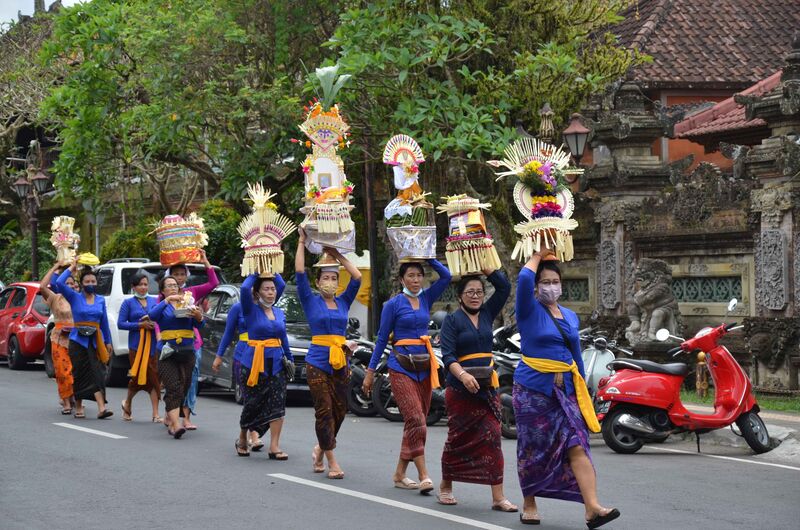From appointing a so-called minister of water to anointing mountains as holy ground, for generations, the Indonesians have had different, yet fascinating ways to preserve the sacred harmony between themselves, the Earth, and the Almighty Creator.
In the spirit of Earth Day which fell on last Monday (22nd of April), Indonesia Expat breaks down some of the cultural and historical traditions held dear by certain tribes and communities in Indonesia, specifically in relation to Earth and natural resources. Some traditions are meant as an expression of gratitude for how the Earth has continually provided sustenance for mankind. Other traditions, meanwhile, serve as a ceremonial prayer to honour and preserve the divine power within the belly of this beautiful, singular planet.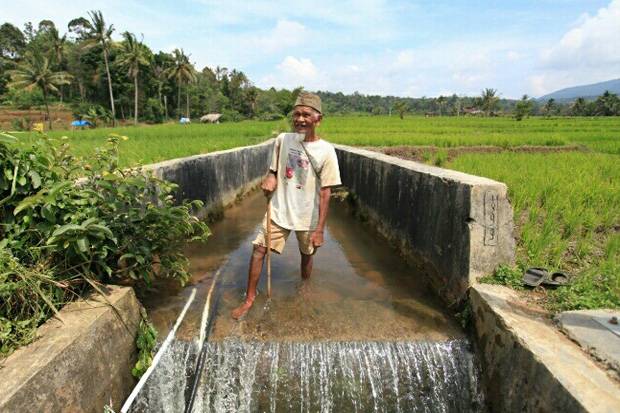
Mantari Bondar (North Sumatra)
A tradition hailing from Hatabosi Village (an abbreviation of four villages, namely Haunatas, Tanjung Rompa, Bonan Dolok, and Siranap), mantari bondar is local wisdom that has endured for hundreds of years and is practiced to protect forests and water sources. The word ‘mantari’ means minister, while the word ‘bondar’ refers to a water channel or flow. Henceforth, mantari bondar roughly means an officer who is dedicated to looking after water channels and forests. Moreover, the appointed mantari bondar oversees penjago bondar, all of whom are elected through local community customary meetings. Through this tradition, the people of Hatabosi Village are committed to preserving forests and conserving water, which is also their main source of clean water and irrigation.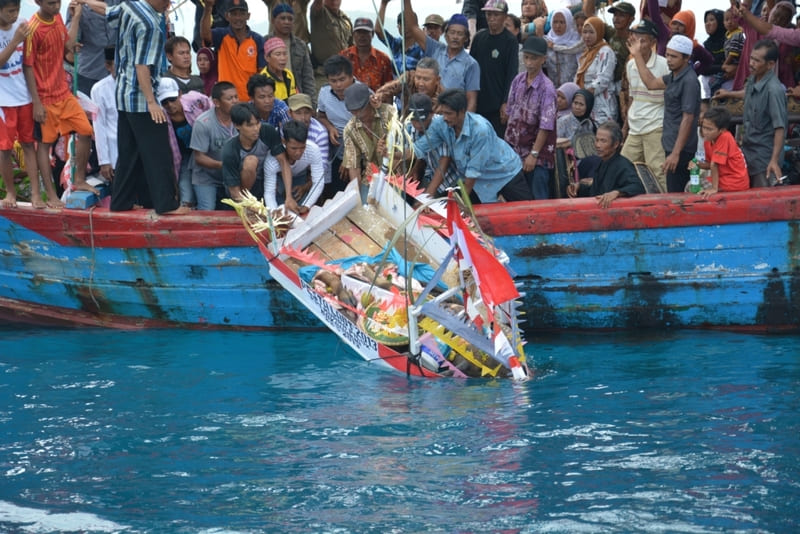
Ruwat Laut (Lampung)
The ruwat laut custom has become a tradition for certain coastal communities in Lampung. Initially held by many people on the coast of Java and then spread to Sumatra, this tradition is an expression of gratitude to God who has given blessings from the sea as well as a request for protection from the divine. Ruwat laut begins with a prayer led by a religious leader and is then followed by the release of the buffalo head which was previously slaughtered according to religious procedures and placed on a decorated boat.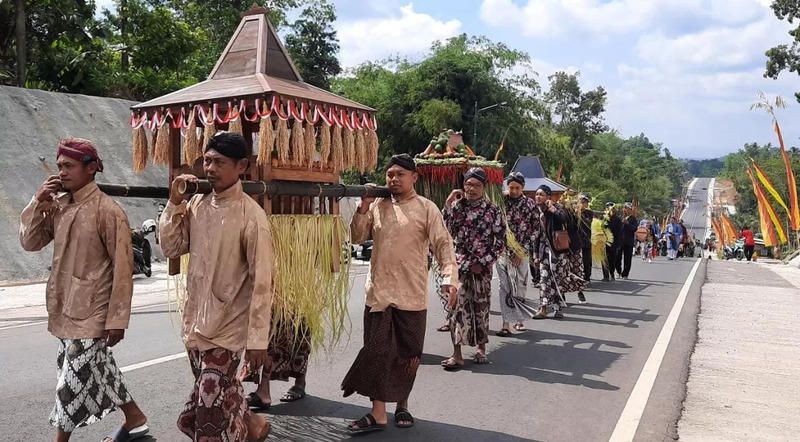
Rasulan (Yogyakarta)
The rasulan tradition in Gunung Kidul, Yogyakarta is a way to express the local community’s gratitude after a bountiful harvest as well as an effort of ‘village cleansing’, the latter’s purpose of which is to pray for safety and dispel negative things in the village, namely natural disasters and disease. Rasulan is usually carried out once a year and consists of a series of events that can be held for several days depending on the agreement of the village residents. This tradition usually begins with community service complemented by several competitions among the villagers. Having said that, what is commonly considered the essence of rasulan is the kenduri event which begins with collecting agricultural produce from the residents. The produce would be arranged in piles accessorised with typical village dishes, which are later paraded around the village.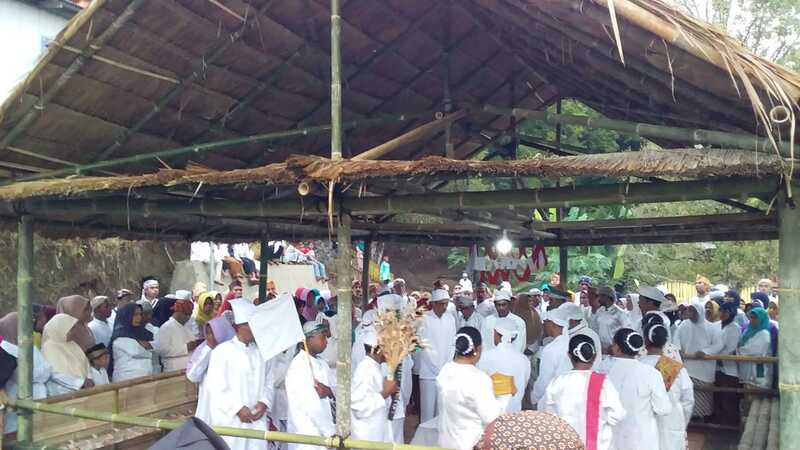
Paca Goya (Maluku Islands)
A tradition of the people in Kalaodi Village, Tidore, Maluku Islands, paca goya is regarded as a ceremony to protect nature. The word ‘paca’ means cleansing whereas the word ‘goya’ refers to a certain, sacred place. In concept, paca goya is a traditional ritual taking place in a sacred location performed for the safety of the children and grandchildren of Kalaodi Village. Paca goya is traditionally carried out to establish peaceful harmony and friendship between the village and the surrounding nature. This tradition has been carried out for generations and is usually performed after the big harvest season. Associated with nature, paca goya is an effort by Kalaodi villagers not to damage and take excess from nature, rooted in their ancestral belief called Bobeto which means “whoever destroys nature, nature will destroy.”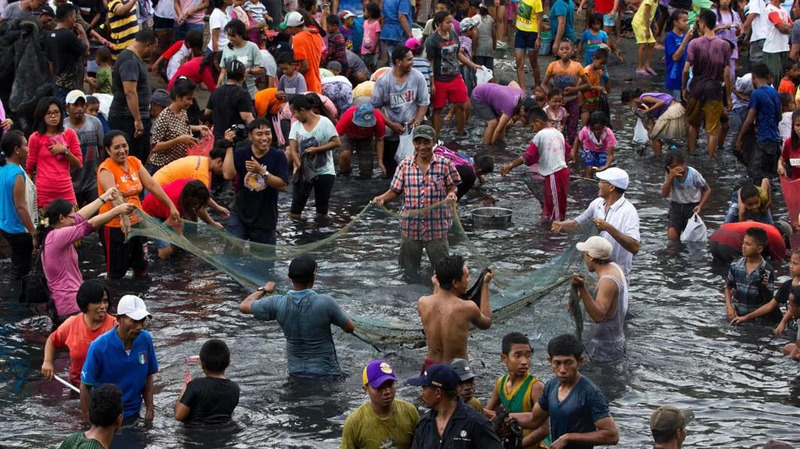
Sasi (Maluku Islands and Papua)
The Maluku Islands and Papua are historically reputable for their natural beauty, both land and sea, which is always maintained and preserved by the locals. One of the locals’ efforts to maintain and preserve such natural beauty is to perform sasi tradition (or, in local terms, ‘prohibition’). Carried out for generations by the natives of the Maluku Islands and Papua until today, sasi can be roughly defined as a prohibition on harvesting or taking certain natural resources in customary areas for some time. On land, sasi is carried out to prohibit people from harvesting certain garden products. At sea, on the other hand, harvesting is prohibited for certain types of fish. This tradition is carried out as an effort to protect the ecosystem and population to prevent damage to nature or depletion of natural resources.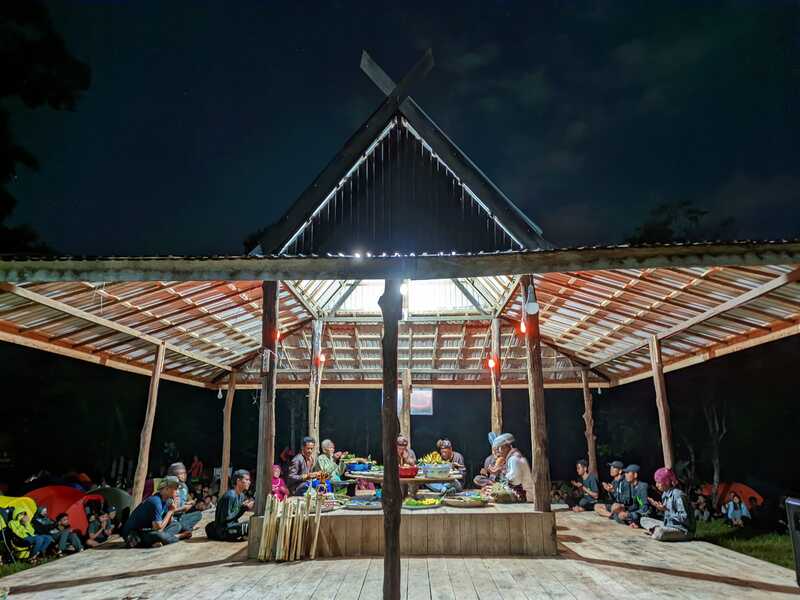
Seserahan Hutan (South Kalimantan)
The Banjar tribe in Paau Village, Banjar Regency, South Kalimantan, carry out an annual forest offering ritual (seserahan hutan) as a form of gratitude for natural products and forest products, as well as their commitment to preserving nature. The event usually starts at night during the full moon between August and October, after the rice harvest, during which the village elders will hold a prayer together with a banquet and a plain flour ritual. Legend has it that the forest offering ritual or seserahan hutan is an acculturation of the ancient Banjar culture and the Bukit Dayak tribe in the Meratus Mountains area.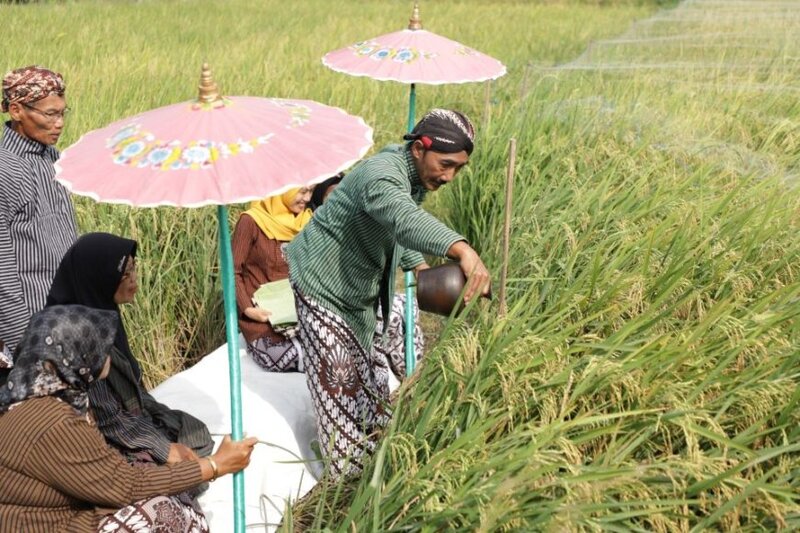
Wiwitan (East Java)
The figure of Dewi Sri (goddess of rice and agriculture) cannot be separated from various traditions of Javanese society. One of those local traditions is the wiwitan tradition which finds its roots in East Java and is carried out by Javanese people before the rice harvest. According to their belief, wiwitan is carried out as an expression of gratitude for the abundant harvest. Wiwitan begins by saying a prayer, continued by cutting rice leaves (padi) to symbolise the approaching harvest. Afterwards, wiwitan continues by distributing the prepared food to the entire local community to be consumed together.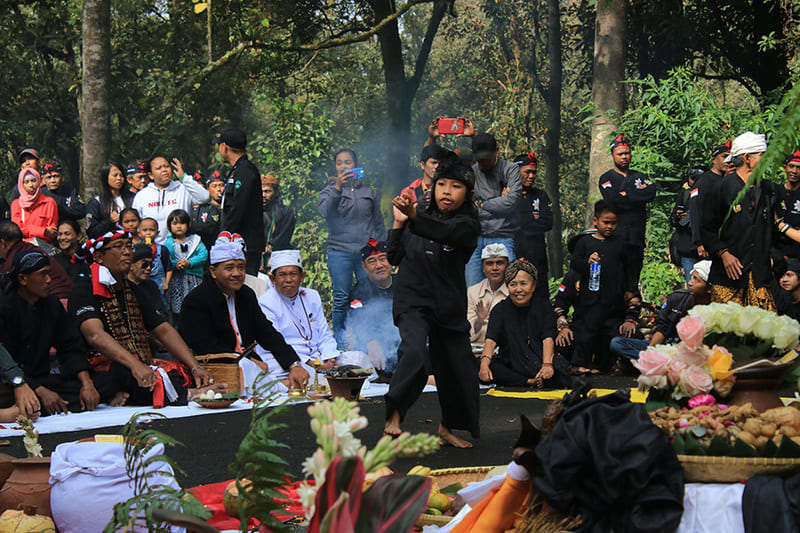
Ngertakeun Bumi Lamba (West Java)
Apart from expressing thankfulness for food supplies and harvests, West Java also has a tradition of protecting Earth which is still carried out today. This tradition, known as ngertakeun bumi lamba, is a ceremony of carrying out the kasepuhan (ancestral) message by entrusting three mountains as so-called ‘natural nails’, meaning that those mountains are to be treated as holy ground. Those three mountains are Mount Tangkuban Perahu, Mount Wayang, and Mount Gede. This is in line with the Sundanese people’s philosophy of life known as Mulasara Buana: to preserve the universe while maintaining natural balance from various transgressions that could lead to depletions and exploitations. The Sundanese also believe that preserving nature is crucial for the sake of the harmony between humankind, Sang Hyang Karesa (the Creator), and Sang Hyang Widhi (the Higher Power). In English, ngertakeun bumi lamba can be roughly translated into “prospering the Earth”.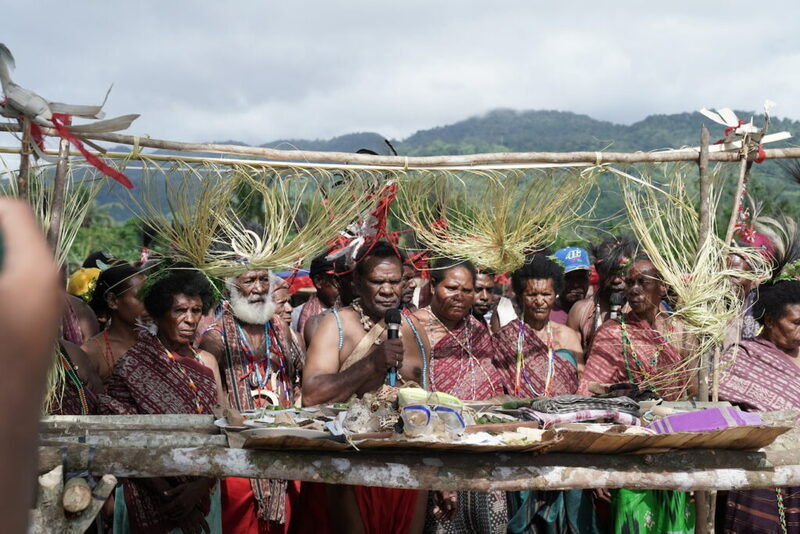
Buka Egek (Papua)
Another tradition of protecting the Earth in Indonesia is buka egek. This tradition is carried out by the Moi tribe, Papua, and is meant to protect nature by taking enough, and not exploiting natural resources excessively. Although similar to sasi, buka egek features a relatively unique custom in which there are only several types of natural resources that are prohibited from being exploited by anyone. Furthermore, the prohibition applies within a certain period, typically between six to 12 months. The prohibition within this period is deliberate so that the natural resources in question would nonetheless be able to grow and be maintained in a sustainable manner.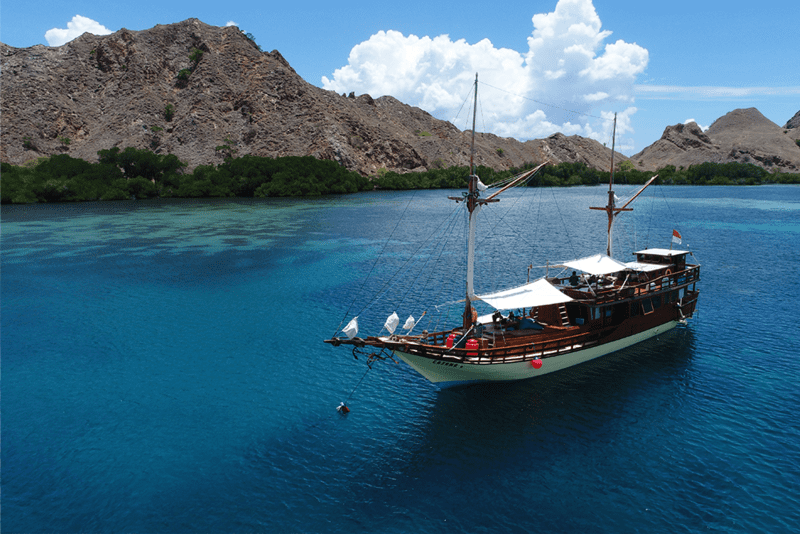
Bapongka (Eastern Indonesia, particularly Sulawesi, Maluku Island, Nusa Tenggara)
The Bajo tribe (currently spread across the Eastern Indonesia region) performs a maritime tradition known as bapongka, referring to an act of carrying out voyages to earn a living or marine products to other areas over several weeks or months. Bapongka is done in groups using lepa (a traditional, mid-sized canoe) and traditional fishing gear. The deliberate use of traditional tools in performing bapongka is considered by the native Bajonesians an effort to preserve the surrounding sea. In addition, the Bajonesians who live by the sea often follow several rules to keep the sea clean and beautiful, one of those rules being that they are not allowed to throw anything into the sea. The Bajonesians also believe that if these provisions are violated, it will invite natural disasters.




